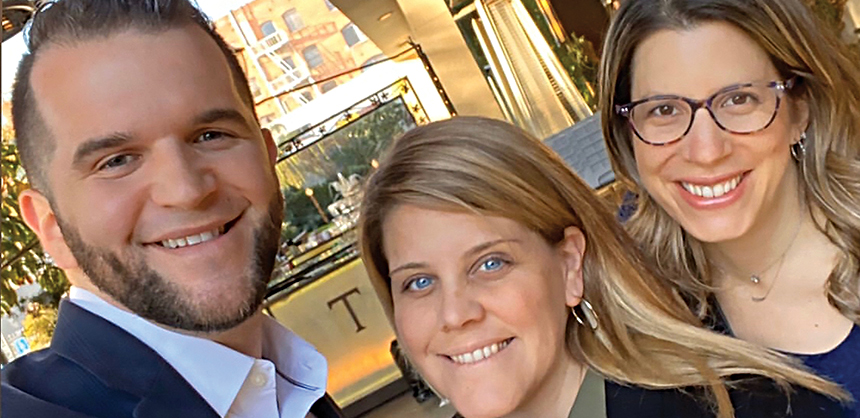Team WorkAugust 12, 2020
Cultivate Strong Partner Relationships For Ultimate Meeting Success By Nancy MuellerTeam Work
Cultivate Strong Partner Relationships For Ultimate Meeting Success
Ask any meeting planner what it takes to create a successful corporate event and one key factor consistently stands out above the rest: the ability to initiate, cultivate and maintain strong partner relationships. With so many individual moving parts involved in the meeting planning process, event organizers depend on the cooperation and commitment of many different people across diverse industries, whether clients, vendors or sponsors, among others, to ensure the success of their meetings.
Angel Hanson, CMP, CMM, started her event planning career at Microsoft before striking out on her own. Today, as CEO of Seattle-based Angel Events, Hanson relies on the relationships she has built with industry insiders, not only at Microsoft, but around the country. “Every single person you’re having a touch point with matters. Where I’m sitting today is proof of that. I have formed relationships with people who are specialists in the industry over 10 to 20 years.” Hanson’s long-term partners include Message Glue, for their storytelling expertise; EventCorp, for registration tools and management; and Gifts by Design, for branded event materials and swag. “My clients are stakeholders in past events or are still at Microsoft; vendors like hotels, A/V teams and speakers. It’s so important to form relationships with every single person in the program so that everyone becomes part of the team, whether an employee, banquet staff or specialists in the industry. That’s huge.”
With more than 20 years of experience in the corporate and consumer events industry, consultant Regina Cook, global principal consultant of the RC Consulting Firm in Rowlett, Texas, sums it up this way: “If you don’t build relationships, your events will not go well. It’s really hard to do an event by yourself, so have the right partners in place.” Once you have your partners lined up, Cook continues, “You need to make sure everyone is on the same page and be able to manage appropriately, because something can always go wrong. You have to have a mindset for evaluating all situations that could happen and manage accordingly. You have to have an A, B, C plan because some things will happen that you didn’t anticipate.”
At Los Angeles-based BDI Events, Amy Green, founder and partner, identifies “CVBs, event venues, hotels, A/V, florists, décor and rental companies, and photographers” among the firm’s many long-term partnerships that she says, “benefit our shared clients in every way imaginable.” She agrees that “clear communication about expectations and division of resources goes a long way in making sure everyone is working together to strengthen the event and delivering a seamless experience for the client.” She adds, “Also, relying and trusting your vendors’ specific areas of expertise and advice is crucial, too, since it’s a partnership.”
More Than Networking
Networking alone is not enough to solidify strong partner relationships, however. Kayla Cook Events is a full-service event management and production company based in Kirkland, Washington, specializing in both corporate and special events. Kayla Cook, owner and lead planner, recalls her mentor’s advice as she launched her career in the corporate meeting industry: “Create real relationships with people you want to sit down and have a beer with. Those relationships are the ones that will always support you. Network, show your face in the industry, but have meaningful conversations that allow you to get to know people.” Kayla Cook thinks that “creating trust and respect with other partners and vendors can help elevate your events and help get your client exactly what you want — more leverage, client referrals, negotiating chips, etc.” She encourages event organizers to “Take care of your partners, offer help and support during load in or at the event, and meet up for coffee or lunch,” she adds. “Follow up after the event is also so important. Not only asking how the event went from the partner’s perspective, but asking how you can excel even more for their next event. Make sure they are paid and taken care of. Building your partnership index is a fundamental part of building your business.”
Cultivating strong partnerships in the meetings industry reaps numerous benefits, Green explains: “Many times, turnaround in the event industry needs to be quick. Having partners we trust means we have experts to provide timely, valuable input and results for our clients.” Green adds, “Having a trusting relationship with event partners means that there is more time spent to maximize other areas of the event as well, such as increasing fundraising if it’s a nonprofit event, attendance in the case of conferences/meetings and spending more time creating the most meaningful content.”
When it comes to developing trust and respect in partner relationships, authenticity and transparency are equally critical components. For Regina Cook, that means “You have to genuinely care about the person you’re working with and let them know you view your relationship as a partnership,” she adds, “My clients expect me to jump through hoops and we both take responsibility and accountability. Let clients know you have their back, by project managing throughout the entire event. Communicating and setting clear expectations, as well as being very honest about the culture of the organization and type of event is very important. Get a feeling of how each of you work. How do you excel? What makes them tick?”
Kayla Cook adds, “Communicate and set expectations, but also understand your partners’ expectations. Ask what they need to be successful.”
For Hanson, finding the common areas with your team makes for a more effective partnership. “We’re all so different, but when we come together we’re such a strong team. We can power through to get things done. We figured out that what makes us work well together is that we’re all level-headed. We look at the big picture and don’t panic when plans change unexpectedly. Instead, we approach the situation with our problem-solving skills and humor, even though we’re taking the matter seriously.”

L-R: Joe Martin and Courtney Mancini from the BDI Events team, and Amy Green, BDI Events founder and partner. Green says her relationships “benefit our shared clients in every way imaginable.” Courtesy of Amy Green
Attitude Counts
Hanson cites the importance of having a positive, confident attitude in cultivating strong partner relationships. “You have to be able to break through to the C-level and get executives to listen to you. You have to come in with confidence and feel comfortable saying ‘No’ to an executive. It’s hard for people to do that because it’s easy to feel intimidated. But, it’s important to be honest. It’s your job to make the executive shine,” Hanson says.
Drawing on the services of a strong partner relationship may happen at any point in the meeting planning process, including requesting assistance at an on-site event. When Regina Cook’s client, Tenet Healthcare, hosted a very large event at a country club in North Carolina in the middle of July with people coming from across the U.S., she asked for help in transporting attendees on-site. “It was so hot,” she says, “that just by walking across from where they were staying to where they were presenting, they could pass out. The vendor got us golf carts and went above and beyond because we had a good relationship with the facility.”
By establishing trust and respect from the outset, it’s also easier to pivot when there’s a discrepancy between the vision and the budget. When one of Kayla Cook’s clients came to her with a $100,000 event idea on a $20,000 budget, she was able to turn to her partner network “for flexibility on budget as well as guidance in building out the specific brand activations — ball pit, mirror experience, etc,” resulting in a successful event and satisfied client.
And when the unexpected happens, such as a change in stakeholders, having a strong partner network in place is critical. After building a connection with one executive, for example, Hanson learned of a change in management that required her to start over again in cultivating a relationship with that person’s replacement. She made inroads by assuring the new executive, “I’m here to support you and make things easy for you” and asking questions like “What do you want from me? What do you need to know about me?” Hanson admits it took several meetings over the course of six or seven months to build that relationship by citing stats, giving ideas, and being open and honest. She knew she had gained trust when she was asked to share her opinions in meetings with other key players when, previously, they had wondered why she had been invited to the meetings in the first place.
Taking the time to invest in relationships within an organization makes it easier for meeting planners in other ways, Hanson suggests. For instance, all executives have administrative assistants who can help pave the way for an introduction. “Administrative assistants handle smaller events so I created a monthly newsletter for them, where I would always have little tips and tricks, information about industry trends, etc. So, I built those relationships. If I saw them at the water cooler, I would ask for their thoughts,” she says. When you get buy-in from one person of influence, those individuals become champions who can advocate on your behalf. You can leverage that relationship with others on the leadership team. By sharing the support you have received from others within the organization, it makes it easier to ask for their support as well.
Then again, when situations arise such as COVID-19 that upend both small and large meeting planning, having a network of established partner relationships allows the event team to come together quickly to make sound decisions for the best of all concerned. Rather than assuming a program must be cancelled completely, trusted partners can problem-solve alternative ways to come together to reach their intended objectives. Ask the client, “How do we build community when the conversation has changed? Do we need to cancel? Reschedule? Or adapt, such as moving to a digital format?”
Not Always Rosy
Not every client or vendor encounter results in a positive outcome, however. When that happens, how can event organizers respond effectively in order to create a different result next time? Regina Cook advises, “Communication is essential. Be upfront and honest about your needs and expectations. Make sure to let your partners know. I appreciate it if they say they can’t accommodate my client’s group for a particular event.” She also emphasizes the importance of debriefing with partners after the event. “Review what went well and what didn’t,” she says.
When there are damaged relationships, hurt feelings or the client is unhappy, “My best advice is to have an honest conversation with the client and vendor about what happened. Ask questions. How did we get there? How can we move forward? At the end of the day, what is the best outcome for our relationship and our client moving forward?” She adds, “Trust your gut. Not every vendor is a good fit for a client event. It’s important to consider who you want to invest your time with or who you want to bring on as a vendor. You want to be able to trust them and their service. Listening to your intuition is very important.”
Meeting planners agree that cultivating strong partner relationships, both within the events community and in every industry with whom event organizers interact, is key to creating a successful event. C&IT










